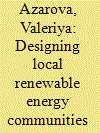| Srl | Item |
| 1 |
ID:
166986


|
|
|
|
|
| Summary/Abstract |
Resistance of the local population to new energy infrastructure may hinder achieving the European Union's goal that 32% of energy consumption come from renewable sources. A vast literature is available on the social acceptance of specific renewable energy technologies, but existing research lacks assessments regarding comprehensive transformations to local energy systems. Moreover, the promising energy storage technology power-to-gas has not yet been addressed in acceptance studies. This paper fills these gaps by analysing data from a choice experiment survey with 2000 respondents across four nations (Germany, Austria, Italy, and Switzerland). Results from the analysis show that solar farms and power-to-gas infrastructure increase acceptance of local energy communities, while wind farms have an ambiguous effect, and gas power plants and power lines decrease acceptance. The derived monthly willingness to pay estimates for the acceptance-increasing technologies ranges from 8.5€ for power-to-gas to 29.5€ for photovoltaics. Additionally, we investigate whether stated support from political opinion leaders at the local, national, and EU levels can increase the acceptance of renewable energy systems. Results suggest that Italian choices are influenced by the opinions of EU and national governmental bodies (+3.5% and +2.7%), and that Swiss choices are sensitive to the opinions of local politicians (+2.3%).
|
|
|
|
|
|
|
|
|
|
|
|
|
|
|
|
| 2 |
ID:
176837


|
|
|
|
|
| Summary/Abstract |
Peak demand reduction is a key element in demand management programs targeting the stabilization of the electricity grid. This study examines a field experiment in Austria that investigated rebates and non-monetary incentives to reduce household electricity consumption during evening peak demand times. The experiment was conducted on 1,257 Austrian households using a smart-phone application and smart-meter data recorded in 15-minutes intervals. Our results show the strongest behavioral change in households who received the monetary incentive, with only weak evidence of changes in the non-monetary treatment groups. Households reduced their consumption in response to the monetary incentive but were then subject to a substantial rebound effect whereby their electricity consumption increased overall.
|
|
|
|
|
|
|
|
|
|
|
|
|
|
|
|